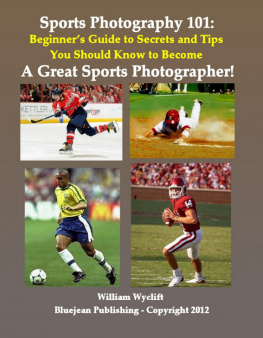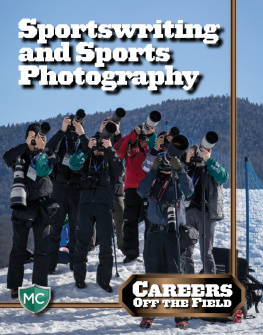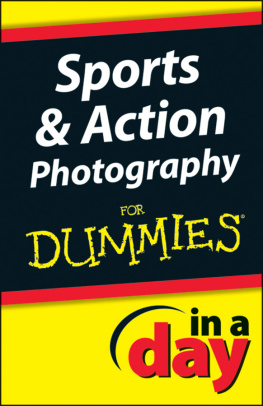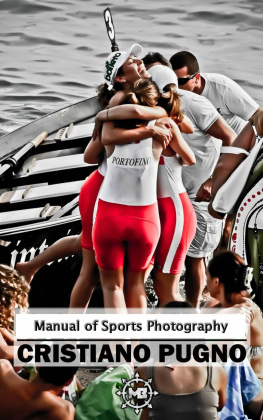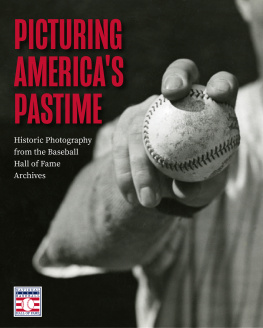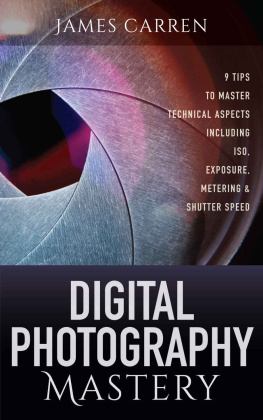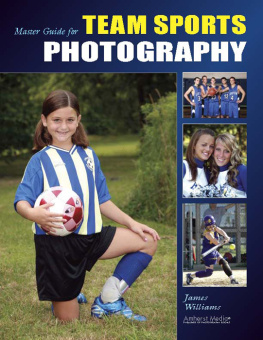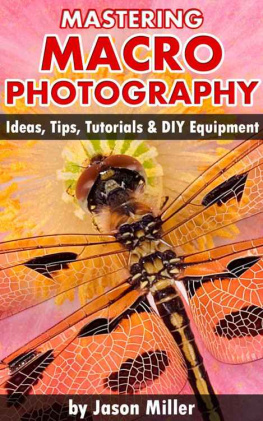SportsPhotography 101:
Beginners Guide to Secrets and Tips
You Should Know
to
Become a Great Sports Photographer!
By
William Wyclift
Smashwords Edition
Bluejean Publishing
Copyright2012
SmashwordsEdition and License Notes
This ebook islicensed for your personal enjoyment only. This ebook may not bere-sold or given away to other people. If you would like to sharethis book with another person, please purchase an additional copyfor each recipient. If youre reading this book and did notpurchase it, or it was not purchased for your use only, then pleasereturn to Smashwords.com and purchase your own copy. Thank you forrespecting the hard work of this author.
You love photography! And Youlove Sports! And you have decided that you want to take yourphotography skills up a notch. And you have decided its time thatyou commit yourself to your own goal; you want to become a SportsPhotographer. And a Good One Too!
Sportsphotography can be a very challenging skill to master, whether youdesire to photograph an NFL, Major League Baseball game or you justwant photos of your childs soccer game to be exceptional. Eitherway, learning about Sports Photography and how to do it the rightway can pay off with some big rewards. And some GREAT personalsatisfaction as well!
Let's getstarted and learn some of the secrets from the pros.
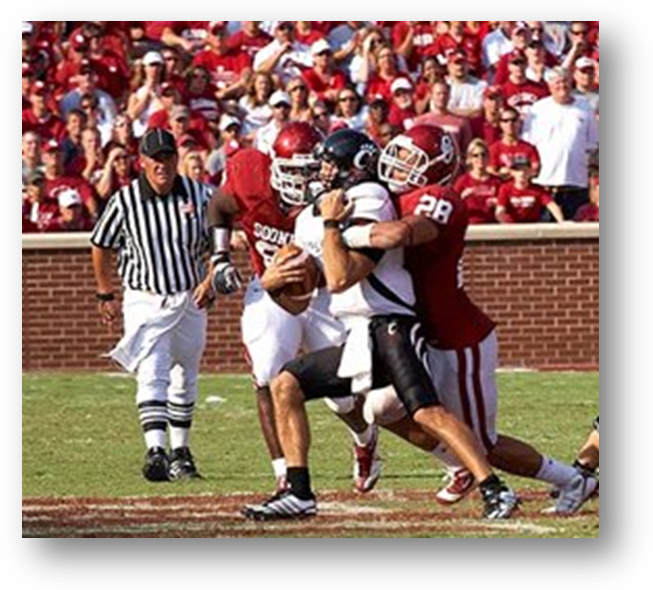

A point andshoot camera just won't get the job done. And if you've ever triedit you know it's true. Have you ever tried to take a photographwith a point and shoot camera only to find that it takes its ownsweet time once you've pressed the shutter button? Well that won'tcut it with sports photography.
Sportsphotography is all about capturing the action and freezing thatmoment in time. You need to know that your camera is going to takethe shot the split second you press that shutter button. If not youwill have missed the picture.
What you arereally going to need in order to get great sports photographs is aDSLR camera. DSLR cameras will take the picture exactly when youintend it to. You also have the ability to use high qualityprofessional lenses.
Your lens is amajor factor in giving you access to the shot you want. You may beable to get by with some less expensive lenses, but you can beassured that the higher quality lenses are going to create the bestphotographs. And, more importantly, will allow you shoot fasteraction shots in lower light!
The firstthing you want to look for in a lens is its maximum aperture. Thenumber you are looking for is 2.8. What this does is it allows morelight to enter the camera which will allow you to have fastershutter speeds. Faster shutter speeds will blur the objects in thebackground, making your subject stand out with much moreimpact.
The next thingto look for is the focal length. Your will need a focal length thatis going to meet your requirements, especially when your shootingconditions change. You might shoot a basketball game one nightwhere a 70mm - 80mm lens is your optimal choice. If you areshooting a football game you might need a 400mm lens to be able toreach out to the middle of the field. Some professionalphotographers even carry 2 cameras during a game. One camera willhave a long telephoto lens while the other has a wide angle lens tocapture the action that is closer to him.
To be honest,many of these lenses will be out of your price range unless you area professional being paid to photograph these games. The Canon400mm professional lenses start at about $6,000, so let's talkabout what's in your budget.
If you aregoing to photograph outdoor sports you definitely will want a lenswith at least the reach of a 200mm lens. The prices on some lensescan still be high, but that's what you are going to need. Many ofthe cheaper lenses with a 200mm reach will have a maximum aperturethat will change as you zoom in, and they will often have a maximumaperture of 6.3 wide open. This is going to cut down on youravailable light quite a bit, and lower your shutter speed. Afterall, our goal is to capture Action shots. So, start keeping aneye on cameras and lens sales. There are always bargains out there.And dont forget to check out Craigslist and eBay for deals.
Here isa Basic Equipment List
Main cameraand Backup camera (DSLR and DSLR or point and shoot)
70-200, 70-300or 100-400 zoom lens (I prefer a 70-200 2.8 pro lens because of itsfast autofocus and great light gathering capabilities)
main cameraand backup (DSLR and DSLR or point and shoot)
70-200, 70-300or 100-400 zoom lens (I prefer a 70-200 2.8 pro lens because of itsfast autofocus and great light gathering capabilities)
1.5 and/or 2xtele-converter
*300 or 400 mmtelephoto lens (preferably the fastest glass you can afford)
24-70 or24-105 zoom for wide angle shots, group photos and portraits
shoe mountstrobe (for fill flash or indoor sports such as basketball) it'sbetter if the flash can be operated off camera wirelessly
*Superclamp orother clamping device for mounting flash or camera monopod forsupporting camera or using with off camera flash
lens cleaningkit
extrabatteries for camera and flash
sufficientmemory cards to get you through a typical event
cameraraincoat for shooting in the rain
camera bag orcamera vest for carrying equipment
* Optional item
Nice to Have, but Not Required
This basic list is pretty comprehensive and willcover most "normal" shooting situations. There are sports andsituations though were other gear is useful, so here's a "nice tohave but not required" list:
extreme wideangle zoom 12-24 (good for extreme sports and other circumstanceswhere the photographer can get close enough to use such a lens)
underwatercamera housing for surf and other water based sports
remote cameracontrol (for rigging a remote camera on a backboard or some otherlocation)
camera standor clamp for remote setup
extra flashunits and wireless triggers
sports camerastrap such as the Black Rapid RS-4 for a second "shoot from thehip" camera
cameraraincoat for shooting in bad weather
camera belt pack (useful for traveling light and movingquickly)
Dont forget, a camera vest is another useful itemfor sports photography. A good vest will make life a lot easier foryou, especially when you have to move fast on the field when totingheavy camera equipment. With the weight distributed more evenly,this will place a lot less strain your back as well as yourshoulders.
YouMust Know About The Sport That You Will BePhotographing!

If you want toget the great shots you have to know where to point the camera. Ifyou don't where to aim your camera, you will be playing catch upand be a step behind the action all day.
So, to get thegreat shot you must anticipate the action. Start to develop a feelfor where the ball will likely go next. You will not always beright, but many times you will be prepared when the action getsthere. Think like the players do. Think about where they may run toor throw the ball to. If a talented wide receiver is running deepyou may want to follow him with your camera and be ready for theshot. If it appears the action isn't going where you think it is,re-adjust. There still may be time to find the next big actionscene.

